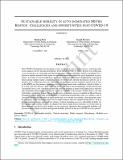Sustainable mobility in auto-dominated Metro Boston: Challenges and opportunities post-COVID-19
Author(s)
Basu, Rounaq; Ferreira, Joseph
DownloadJTRP_2021_COVID_Metro_Boston_Preprint.pdf (17.18Mb)
Publisher with Creative Commons License
Publisher with Creative Commons License
Creative Commons Attribution
Terms of use
Metadata
Show full item recordAbstract
The COVID-19 pandemic has disrupted society as we knew it in a variety of ways, with especially severe impacts on low-income households. Even before COVID-19, Metro Boston was witnessing a rise in private car ownership and decreasing mass transit ridership, further exacerbated by a historical spatial mismatch that made low-income commuters relatively more dependent on mass transit. Accounts of overcrowded buses and trains since early March have heightened psychological dread among regular transit commuters, some of whom have already purchased a private car or intend to do so within the next year. Uncertainty around transit service frequency and erosion of trust in the MBTA are the primary challenges for rebuilding transit rider confidence, which is likely to be a long and slow process. Low transit ridership levels can lead to fiscal challenges on the horizon and consequent service cuts, which necessitate the need for adopting a multi-modal approach to affordable and sustainable urban mobility. A narrow window is available to discourage a further shift to cars that will further cannibalize transit. Given the diversity of mobility services available in Metro Boston, designing a MaaS pilot with close attention to technological integration and cost salience can be crucial in showcasing the value of multi-modal and cross-modal accessibility. Such programs must be synergistic with concurrent transit service improvements and car-commute disincentives, such as in-town parking charges and road-use charges, without impeding access to affordable mobility for low-income and essential workers. Looking at the various agile policy responses of several cities in Metro Boston over the last few months, we are cautiously optimistic that sustainable mobility will become a major theme in urban and regional mobility policies in the post-COVID recovery period.
Date issued
2021-02Department
Massachusetts Institute of Technology. Department of Urban Studies and PlanningJournal
Transport Policy
Publisher
Elsevier BV
Citation
Basu, Rounaq and Joseph Ferreira. "Sustainable mobility in auto-dominated Metro Boston: Challenges and opportunities post-COVID-19." Transport Policy 103 (March 2021): 197-210. © 2021 Elsevier Ltd
Version: Author's final manuscript
ISSN
0967-070X